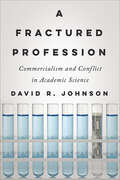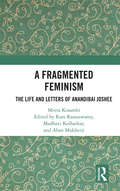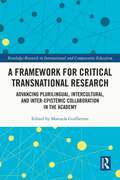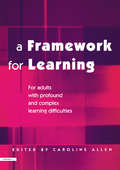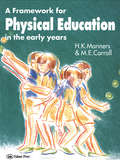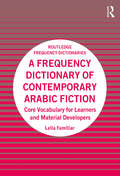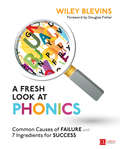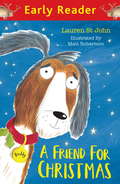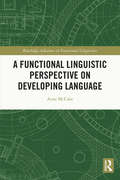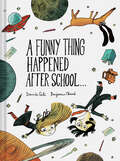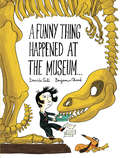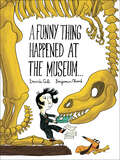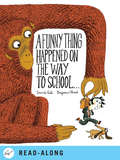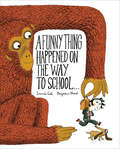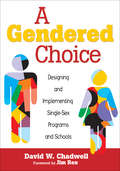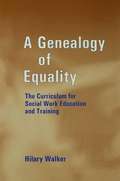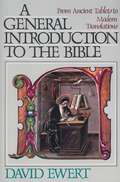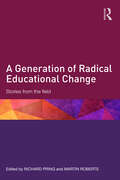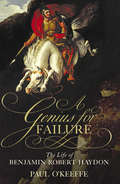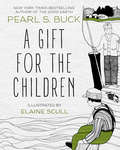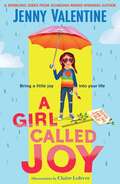- Table View
- List View
A Fractured Profession: Commercialism and Conflict in Academic Science (Critical University Studies)
by David R. JohnsonExploring the growing division among academic scientists over a profit motive in research.The commercialization of research is one of the most significant contemporary features of US higher education, yet we know surprisingly little about how scientists perceive and experience commercial rewards. A Fractured Profession is the first book to systematically examine the implications of commercialization for both universities and faculty members from the perspective of academic scientists. Drawing on richly detailed interviews with sixty-one scientists at four universities across the United States, sociologist David R. Johnson explores how an ideology of commercialism produces intraprofessional conflict in academia.The words of scientists themselves reveal competing constructions of status, conflicting norms, and divergent career paths and professional identities. Commercialist scientists embrace a professional ideology that emphasizes the creation of technologies that control societal uncertainties and advancing knowledge toward particular—and financial—ends. Traditionalist scientists, on the other hand, often find themselves embattled and threatened by university and federal emphasis on commercialization. They are less concerned about issues such as conflicts of interest and corruption than they are about unequal rewards, unequal conditions of work, and conflicts of commitment to university roles and basic science.Arguing that the division between commercialists and traditionalists represents a new form of inequality in the academic profession, this book offers an incisive look into the changing conditions of work in an era of academic capitalism. Focusing on how the profit motive is reshaping higher education and redefining what faculty are supposed to do, this book will appeal to scientists and academics, higher education scholars, university administrators and policy makers, and students considering a career in science.
A Fragmented Feminism: The Life and Letters of Anandibai Joshee
by Meera Kosambi"This book is a search for ‘the real Anandibai Joshee’ —— a search in which the readers are invited to participate." In her short and eventful life, Anandibai Joshee, the first Indian woman to earn a medical degree, broke many stereotypes. Literate at a time when it was taboo for a girl to attend school or even ‘pick up a paper’, she was courageous, articulate, and assertive. And ambitious. Fuelled by a desire to improve the healthcare that was available to Indian women at that time, she travelled across the seas to the United States to study medicine. Meera Kosambi’s biography of Anandibai is more than just a retelling of the life of a woman who was ahead of her times. Drawing on a host of narratives, Kosambi recovers Anandibai’s many voices, which have been submerged in history — that of a conflicted feminist, a nationalist, and a reformer, among others — and her engagement with the world at large. This volume is a testament to Meera Kosambi’s commitment to social history. When she passed away in 2015, she left an incomplete manuscript that has painstakingly been put together by the editors. Drawing on archival research, including a host of Anandibai’s letters, her poems in Marathi, newspaper reports, and rare photographs, this book will be of immense interest to scholars and researchers of modern Indian history, sociology, gender, and South Asian studies.
A Framework for Critical Transnational Research: Advancing Plurilingual, Intercultural, and Inter-epistemic Collaboration in the Academy (Routledge Research in International and Comparative Education)
by Manuela GuilhermeBy foregrounding successful transnational research projects conducted across Latin America and Europe, this edited collection contests epistemological hegemony and heterogeneity in the academy and highlights feasible models for research cooperation across diverse languages, cultures, and epistemologies. Chapters focus on the practical and theoretical tenets of responsible intra-national research and propose the "Glocacademia" framework as a means of enhancing critical reflection on issues that can inhibit plurilingual, intercultural, and inter-epistemic research. The text offers key recommendations to support institutions and researchers to develop intercultural awareness, multi-level citizenship, and a readiness to embrace diverse knowledge ecologies. The book builds on existing discussions on multiculturalism, interculturality, and transculturality to offer high academic value to the discussion of higher education and research. Offering important contributions to the study of global academic research, this volume will be of interest to scholars and researchers with an interest in international and comparative education, as well as multicultural studies in education research.
A Framework for K-12 Science Education
by Helen QuinnScience, engineering, and technology permeate nearly every facet of modern life and hold the key to solving many of humanity's most pressing current and future challenges. The United States' position in the global economy is declining, in part because U. S. workers lack fundamental knowledge in these fields. To address the critical issues of U. S. competitiveness and to better prepare the workforce, A Framework for K-12 Science Education proposes a new approach to K-12 science education that will capture students' interest and provide them with the necessary foundational knowledge in the field. A Framework for K-12 Science Education outlines a broad set of expectations for students in science and engineering in grades K-12. These expectations will inform the development of new standards for K-12 science education and, subsequently, revisions to curriculum, instruction, assessment, and professional development for educators. This book identifies three dimensions that convey the core ideas and practices around which science and engineering education in these grades should be built. These three dimensions are: crosscutting concepts that unify the study of science through their common application across science and engineering; scientific and engineering practices; and disciplinary core ideas in the physical sciences, life sciences, and earth and space sciences and for engineering, technology, and the applications of science. The overarching goal is for all high school graduates to have sufficient knowledge of science and engineering to engage in public discussions on science-related issues, be careful consumers of scientific and technical information, and enter the careers of their choice. A Framework for K-12 Science Education is the first step in a process that can inform state-level decisions and achieve a research-grounded basis for improving science instruction and learning across the country. The book will guide standards developers, teachers, curriculum designers, assessment developers, state and district science administrators, and educators who teach science in informal environments.
A Framework for Learning: For Adults with Profound and Complex Learning Difficulties
by Caroline AllenThis book offers carers, practitioners and managers a tried and tested structure for enabling adults with a range of complex needs to develop their individual skills and experience. It also provides a flexible framework which is suitable for specialist colleges and training centers for people with learning difficulties.
A Framework for Physical Education in the Early Years
by M. E. Carroll Miss Hazel Manners Hazel MannersThis text examines the National Curriculum Physical Education to Key Stage 1 in the light of recent changes. It identifies six basic principles which provide the foundation for the rationale, curriculum content, the teaching and the planning processes required in providing a balanced programme for children aged 3 to 7 years. Special attention is paid to movement education for children of nursery age, providing as it does a sound foundation for later work in the early years. Games, gymnastics, dance and swimming are covered in detail and sample units of work for each group provide students in initial teacher training and teachers with valuable materials for use in schools. The final chapter looks at the role of the curriculum leader or co-ordinator for physical education at Key Stage 1, offering guidance on how to agree and implement a common school policy.
A Frequency Dictionary of Contemporary Arabic Fiction: Core Vocabulary for Learners and Material Developers (Routledge Frequency Dictionaries)
by Laila FamiliarA Frequency Dictionary of Contemporary Arabic Fiction provides a list of the top 2,000 words occurring in contemporary Arabic fiction. Based on a written corpus that contains 144 literary samples, the dictionary addresses key areas of Arabic language learning and teaching, including lexical frequency, reading skills, and Arabic literature. Each entry in the main frequency index includes a sample sentence, English translation, and frequency indicator, and alphabetical and part-of-speech indexes are provided for ease of use. The dictionary also contains 19 thematically organized and frequency-ranked lists of words on a variety of topics, such as food, places, emotions, and nature. Engaging and highly useful, this Frequency Dictionary is a valuable resource for students and instructors working in the area of TAFL, and for applied linguists interested in Arabic corpus linguistics.
A Fresh Look at Phonics, Grades K-2: Common Causes of Failure and 7 Ingredients for Success (Corwin Literacy)
by Wiley W. BlevinsIn a Fresh Look at Phonics, Wiley Blevins, author of the blockbuster Phonics from A-Z, explains the 7 ingredients of phonics instruction that lead to the greatest student gains, based on two decades of research in classrooms. For each of these seven must-haves, Wiley shares lessons, routines, word lists, tips for ELL and advanced learners, and advice on pitfalls to avoid regarding pacing, decodable texts, transition time, and more. A Fresh Look at Phonics is the evidence-based solution you have been seeking that ensures all students develop a solid foundation for reading.
A Fresh Look at Phonics, Grades K-2: Common Causes of Failure and 7 Ingredients for Success (Corwin Literacy)
by Wiley W. BlevinsIn a Fresh Look at Phonics, Wiley Blevins, author of the blockbuster Phonics from A-Z, explains the 7 ingredients of phonics instruction that lead to the greatest student gains, based on two decades of research in classrooms. For each of these seven must-haves, Wiley shares lessons, routines, word lists, tips for ELL and advanced learners, and advice on pitfalls to avoid regarding pacing, decodable texts, transition time, and more. A Fresh Look at Phonics is the evidence-based solution you have been seeking that ensures all students develop a solid foundation for reading.
A Friend for Christmas (Early Reader)
by Lauren St JohnA full colour red Early Reader story about a dog who comes home for Christmas from BLUE PETER BOOK AWARD-winning author, Lauren St John.Early Readers are stepping stones from picture books to reading books perfect for building confidence in new readers and reluctant readers. A blue Early Reader is perfect for sharing and reading together. A red Early Reader is the next step on your reading journey.If Luka could have anything in the world for Christmas, it would be to see Buddy again, his red and grey mongrel with one floppy ear. But Buddy has been missing for months. Then again, sometimes, at Christmas time, wishes really do come true.
A Friend for Henry
by Jenn BaileyIn Classroom Six, second left down the hall, Henry has been on the lookout for a friend. A friend who shares. A friend who listens. Maybe even a friend who likes things to stay the same and all in order, as Henry does. But on a day full of too close and too loud, when nothing seems to go right, will Henry ever find a friend—or will a friend find him? With insight and warmth, this heartfelt story from the perspective of a boy on the autism spectrum celebrates the everyday magic of friendship.
A Functional Linguistic Perspective on Developing Language (Routledge Advances in Functional Linguistics)
by Anne McCabeThis volume offers a comprehensive account of language development from a Systemic Functional Linguistic (SFL) perspective, integrating theory and data from a wide range of research studies. The book begins by taking an in-depth look at SFL theory and its focus on texts, highlighting the metafunctional nature of language and the ways in which individuals’ repertoires of meaning-making resources develop as they interact with the world and with others. Grounded in an SFL approach, the successive chapters consider in turn the key stages of language development, from infancy to school settings to additional, second, and foreign language learning contexts. Each chapter incorporates a range of SFL studies to demonstrate shifts in language development across these stages, but also the discussion of other functional perspectives to examine the ways in which these different approaches inform one another. A concluding chapter considers the implications of these studies for future research as well as for pedagogical practices in literacy teaching. In its consideration of the relationship between SFL theory and its application to language development, this book will be key reading for students and scholars in Systemic Functional Linguistics, language and education, and literacy studies.
A Funny Thing Happened After School . . .
by Davide CaliIt's a race to do homework—in space! But first, there's a spaceship jam. Then there's the moon detour, the Mars alien exploration, and a stop on the gravity-defying International Space Station. And that's just the beginning! Henry and Ali want to get their homework done—they really do! But how are they supposed to study the solar system when they seem to be swept up in an endless series of interstellar surprises?From Davide Cali and Benjamin Chaud, the author-illustrator team behind I Didn't Do My Homework Because . . ., comes an action-packed, entertaining tale about trying to get your homework done, whether you're in—or out—of this world!
A Funny Thing Happened at the Museum . . .
by Benjamin Chaud Davide CaliThere's more to this museum than meets the eye! This is the wonderfully wacky world of celebrated international author-illustrator team Davide Cali and Benjamin Chaud, the duo behind Junior Library Guild selections I Didn't Do My Homework Because . . . , The Truth About My Unbelievable Summer . . . , and A Funny Thing Happened on the Way to School . . . . Notoriously (and delightfully) unreliable narrator Henry is late to a museum where his class is spending the day. But he has a plan: He'll just catch up in one of the exhibits. That's not possible in these halls! With volcanoes erupting, dinosaurs charging, and secret stairwells lurking, reuniting with his classmates becomes a quest of outrageous proportions. Young readers will revel in this entertaining book's over-the-top antics.
A Funny Thing Happened at the Museum . . .: (funny Children's Books, Educational Picture Books, Adventure Books For Kids ) (A\funny Thing Happened Ser.)
by Benjamin Chaud Davide CaliThere's more to this museum than meets the eye! This is the wonderfully wacky world of celebrated international author-illustrator team Davide Cali and Benjamin Chaud, the duo behind Junior Library Guild selections I Didn't Do My Homework Because . . . , The Truth About My Unbelievable Summer . . . , and A Funny Thing Happened on the Way to School . . . . Notoriously (and delightfully) unreliable narrator Henry is late to a museum where his class is spending the day. But he has a plan: He'll just catch up in one of the exhibits. That's not possible in these halls! With volcanoes erupting, dinosaurs charging, and secret stairwells lurking, reuniting with his classmates becomes a quest of outrageous proportions. Young readers will revel in this entertaining book's over-the-top antics.
A Funny Thing Happened on the Way to School...
by Benjamin Chaud Davide CaliFirst, some giant ants steal breakfast.Then there are the evil ninjas, massive ape, mysterious mole people, giant blob, and countless other daunting (and astonishing) detours along the way to school. Are these excuses really why this student is late? Or is there another explanation that is even more outrageous than the rest? From Davide Cali and Benjamin Chaud, the critically acclaimed author/illustrator team behind I Didn't Do My Homework Because . . . comes a fast-paced, actionpacked, laugh-out-loud story about finding the way to school despite the odds—and the unbelievable oddness! Plus, this is the fixed format version, which will look almost identical to the print version. Additionally for devices that support audio, this ebook includes a read-along setting.
A Funny Thing Happened on the Way to School...
by Benjamin Chaud Davide CaliFirst, some giant ants steal breakfast.Then there are the evil ninjas, massive ape, mysterious mole people, giant blob, and countless other daunting (and astonishing) detours along the way to school. Are these excuses really why this student is late? Or is there another explanation that is even more outrageous than the rest? From Davide Cali and Benjamin Chaud, the critically acclaimed author/illustrator team behind I Didn't Do My Homework Because . . . comes a fast-paced, actionpacked, laugh-out-loud story about finding the way to school despite the odds--and the unbelievable oddness!
A Gendered Choice: Designing and Implementing Single-Sex Programs and Schools
by David W. ChadwellA comprehensive road map for single-gender initiatives, this experience-based resource offers a step-by-step process with design and implementation tools for developing and sustaining high-quality single-sex programs.
A Genealogy of Equality: The Curriculum for Social Work Education and Training (Woburn Education Series)
by Hilary Walker Dr Hilary WalkerThis account of the incorporation of issues of equality into the social work education curriculum focuses upon the period between 1989 and 1995, a time of considerable activity and rapid change. It is based upon research carried out by the author whilst studying for a doctorate in education.
A General Introduction to the Bible: From Ancient Tablets to Modern Translations
by David EwertThere are two strands woven together in the history of the Bible and its translations. One is the development of the biblical text: its materials, texts, and translations. The second is the story of the men and women who went to great extremes, at times risking death, in order to provide their generation with the Word of God in a language that could be understood. David Ewert skillfully combines both these elements in this informative and captivating book, beginning with what "Bible" means, how the Bible is organized, and how various books were named. He explores such other matters as the development of the biblical languages, the canon and the history of the testaments, and early versions of the Bible. English translations, from the time of Wycliffe to the present, are the focus of several chapters. A General Introduction to the Bible is filled with photographs of ancient texts, pages from various Bibles, photographs of key individuals and settings -- all of which add understanding to the Bible's history. Maps and charts show the development of languages, textual families, and the relationship of various translations and revisions. There are suggested readings and an extensive glossary and index.
A Generation of Radical Educational Change: Stories from the field
by Richard Pring and Martin RobertsHow much have teachers and their pupils benefitted from the top-down Westminster-led control of policy held in place by a powerful national inspection regime? A Generation of Radical Educational Change: Stories from the Field is an exploration of the revolutionary impact of the greater and continuing involvement of central government in education policy-making which began in 1976 and was accelerated by the 1988 Education Act and subsequent legislation. In the book, a dozen distinguished contributors from a wide range of sectors explain and reflect on how they worked to do their best for their schools, teachers and pupils in these years of great change. They understand the reasons, explained by Lord Baker in his early chapter, for a National Curriculum in 1988, and also the reasons for a more effective national inspection system. Yet their stories accumulate to become a powerful critique of the top-down policies of the last two decades. These policies have been too numerous, short-term, incoherent and partisan; governments have been indifferent to professional opinion and serious research, and have relied excessively on measurable outcomes and simplistic Ofsted judgments. Our current system is narrower and less democratic than it was, but evidence is hard to find that English pupils are doing any better in international comparisons. The combined reflections in this volume are timely in these years of lively educational debate as are the suggestions for future policy. A Generation of Radical Educational Change is an invaluable read for current and aspiring headteachers, policy makers and those with an interest in education policy and how it evolves.
A Genius for Failure: The Life of Benjamin Robert Haydon
by Paul O'Keeffe* Haydon's first attempt at suicide ended when the low calibre bullet fired from his pistol fractured his skull but failed to penetrate his brain. * His second attempt also failed: a deep slash across his throat left a large pool of blood at the entrance to his studio, but he was still able to reach his easel on the opposite side of the room. *Only his third attempt, another cut to the throat which sprayed blood across his unfinished canvas, was successful. He died face-down before the bespattered 'Alfred and the First British Jury', his final bid 'to improve the taste of the English people' through the High Art of historical painting.* Such intensity, struggle and near-comic inability to succeed encapsulate Haydon's career. Thirty years before his death his huge, iconic paintings had made him the toast of early 19th-century London, drawing paying crowds to the Egyptian Hall in Piccadilly for months and leading to nationwide tours. * However, his attempt to repeat such success three months before his death was to destroy him: barely a soul turned up, leaving the desperate painter alone, humiliated, and facing financial ruin. * In A Genius for Failure Paul O'Keeffe makes clear that the real tragedy of Haydon lay in the extent to which his failures were unwittingly engineered by his own actions - his refusal to resort to the painting of fashionable portraits, for example, and his self-destructively acrimonious relationship with the RA.* The company he kept - Keats, Shelley, Wordsworth, Sir Robert Peel and the Duke of Wellington, among many others - and the momentous events he lived through - The Battle of Waterloo, the Coronation of George IV, and the passing of the first Parliamentary Reform Bill - make A Genius for Failure not only the definitive biography of this fascinating and tragic painter, but a stirring portrayal of an age.
A Gift for the Children
by Pearl S. BuckAn illustrated treasury of stories for kids, including two Christmas tales, from the beloved Pulitzer and Nobel Prize–winning author of The Good Earth. This collection of more than twenty stories brings readers back to the timeless fascinations of childhood—thunderstorms and star-filled skies, rabbits and rosebushes—and journeys into the larger world we discover as we grow older, learning about foreign languages and different cultures, or responsibilities like caring for an elderly grandparent. It also includes two Christmas classics, as well as a humorous tale of how cats and dogs came to dislike each other. Divided into sections for both little children and bigger ones, A Gift for the Children is a joy in any season, whether you&’re reading out loud at bedtime or encouraging kids to read on their own. From the New York Times–bestselling author famed for her travels and adventures, particularly in China, it&’s a delightful, heartwarming, and enriching volume of short fiction.
A Girl Called Al
by Constance C. GreeneA seventh-grade girl, her slightly fat girl friend, Al, [a nonconformist],and the assistant superintendent of their apartment building form a mutually needed friendship with the usual--and a few unusual--joys and sorrows.
A Girl Called Joy: Bring a little JOY into your life! (A Girl Called Joy #1)
by Jenny ValentineFor readers aged 9+ comes a SPARKLING new middle-grade series from Guardian award-winning author Jenny Valentine, perfect for fans of Jacqueline Wilson, Cath Howe and Lara Williamson! Meet ten-year-old Joy Applebloom, a girl with a knack for finding the silver lining in even the darkest of rainclouds. After years of travelling the world with her parents and older sister, Claude (Claude rhymes with bored, which is just about right), Joy and her family move to suburbia – back to school, back to her grumpy, rule-obsessed grandad and back to normality. Joy soon finds her usual irrepressible positivity and zest for life waning, but when the powers that be threaten to pull down a mighty oak tree, Joy decides to fight back, and realizes that not all magic requires wands and spells, and perhaps the most important sort of magic is the power, resilience and courage that was there all along . . .
